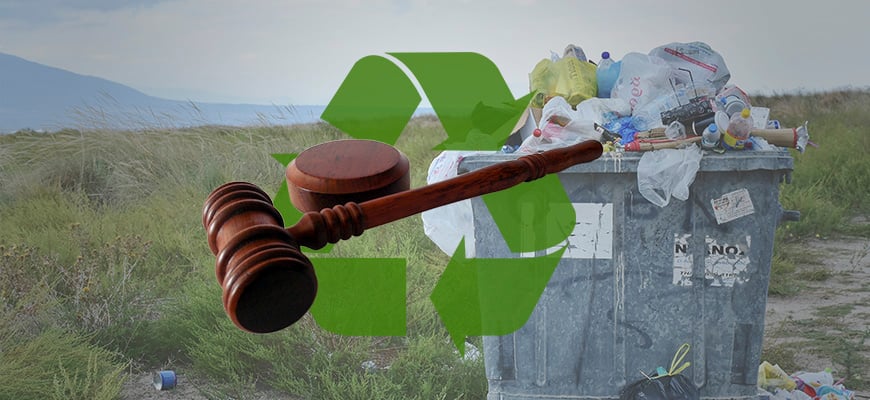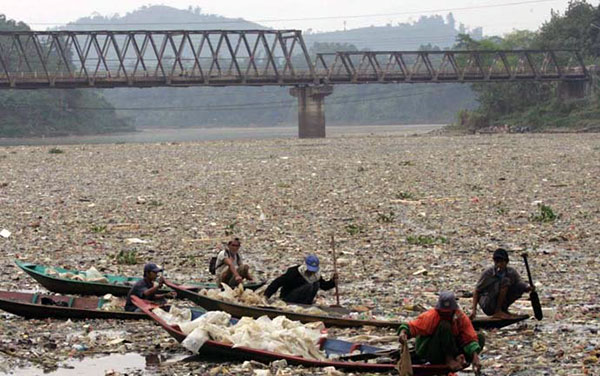
Creating your own Rocket Industrial personal account has many benefits:

Finding the balance between cost, performance and environmental impact is extremely difficult for many organizations when it comes to choosing packaging materials. As more cities across the United States and the world begin to implement laws on packaging waste, it makes the situation even more challenging. So, what are the big changes to packaging legislation and why are certain packaging products now being looked at as villains threatening planet earth?
Consumer awareness of packaging and plastic waste is causing businesses to step up to reduce waste, but the addition of recent laws and bans regrading products have really leveled up the push for sustainability and recycling by all parties.
Polystyrene, also known as “Styrofoam”, is made from fossil fuels and synthetic chemicals and is not biodegradable, so it never breaks down and ultimately remains in the waste stream forever. The material is also not easily recyclable, there are currently few facilities that attempt to recycle it due to the material being bulky and expensive to transport. This had led to many cities across the nation banning foam food serving products and foam packaging.
Most recently and notably, New York City’s foam ban took effect on January 1, 2019. The ban states that businesses must stop using and selling foam containers for takeout food, foam plates, cups and bowls. It also bans the use and manufacturing of foam packing peanuts in the city. Fines of up to $1,000 per offense are possible for not adhering to the new law. There are some exceptions such as prepacked food and protective foam shipping blocks. Also, small businesses making under $500,000 in gross income can apply for exemption if they can prove that switching to an alternative sustainable product will create a definite financial hardship for them.
The plastic bag is another enemy of the state since plastic bags take anywhere from 10 to 1000 years to decompose depending on environmental conditions. It’s estimated that the lifespan of a plastic bag is 12 minutes, then it makes its way to the landfills or unfortunately, our marine ecosystems which adds to the estimated 8 million+ metric tons of plastic that enters our oceans every year. Plastic bag bans are becoming increasingly popular with statewide bans in California and Hawaii and citywide bans in cities such as Boston, Providence and Portland.
Germany’s new Packaging Act pushes companies doing business in Germany to adhere with it’s committment to having the best recycling rate in the world. As of January 1, 2019, hefty fines and fees will be given to companies who are wasting packaging material and not using environmentally friendly packaging products.
Australia’s government announced in 2018 that it had a set a goal of 100% of Australian packaging to be recycled, reusable or compostable by 2025. This applies to all packaging, whether the product is imported or locally packaged. The Australian Packaging Covenant Organization (APCO) will be leading this change and at this point it’s voluntary for companies to sign on but buy-in will be strongly and frequently encouraged. Actual legislation will be a last resort.
The UK has aimed to the gold standard on eliminating plastic. Its 25-year plan includes creating plastic-free aisles in grocery stores, taxing plastic bag use, banning plastic straws, implementing a return for money plan for plastic bottles, and implementing taxes on coffee cups. The board also has a plan for industries to be more responsible for their waste by paying the recycling fee on the plastic packaging their products are sold in.
Counties such as Zimbabwe, France, Morocco, Rwanda and others have implemented full bans on single-use plastics and polystyrene. Even the Queen of England has made her own ban on all plastic straws and bottles from the Royal Estate, requiring that all food containers be biodegradable.
We’ve all seen the horror photos. An island of floating garbage, a dead beached whale full of waste, a sea turtle deformed by plastic rings… the list goes on. We know there is a problem and changes to the way manufacturers create and package their products, removing unnecessary foam and plastic when possible, and continuing to push the importance of properly recycling will make a difference, but will it be enough to turn things around?
According to a report by Ocean Conservancy, about 80% of ocean plastic comes from land-based sources, meaning uncollected waste and litter on beaches or that have blown in the wind and sewage leakage or dump off from counties with undeveloped waste collection systems. The amount of waste from regions with poorly designed waste management systems is substantial. In fact, China, Indonesia, Philippines, Thailand and Vietnam are dumping more plastic into the oceans than the rest of the world combined. The waste situation in Indonesia has become dire enough that it’s now considered a military activity to clean up the Citarum River, which has been dubbed the world’s most polluted river in the world”. A 7-year cleanup plan has been initiated and stricter waste laws may have to be enforced on manufacturers in the Citarum area. Global changes to the waste stream and encouraging industries in these countries especially to make changes will be crucial in the upcoming years to undo current damages.

We’re all aware of the issues and can all be part of the solution. Increasing recycling programs, bettering waste-management systems around the world, eliminating unnecessary, wasteful materials in our products and shipments… it all leads to improving our environment now and in the future.
Struggling to find your packaging’s cost, performance, sustainability balance? We can help with you that. Join us in making our world a better place by reducing packaging waste and choosing better materials that provide the best protection for your products. You may be surprised to find out that a more sustainable solution can actually save you money. Contact our team of packaging specialists and engineers to look at how we can make your packaging greener while saving you some green.